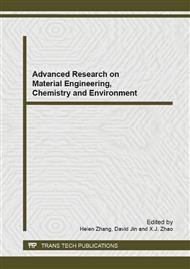p.371
p.375
p.379
p.383
p.387
p.392
p.396
p.400
p.405
Study on Tourism Environment with Strategic Research on the Tourism Development of Hunan Low-Carbon
Abstract:
The unique tourism product system originated from the blend of beautiful natural scenery and the profound Huxiang culture have formed the tourism environment advantages for Hunan to develop low-carbon tourism. In order to build up a powerful tourism city and adhere to the principles of green tourism and low-carbon tourism, Hunan province has created tourism environment advantages set about from government, enterprises and social citizens, devoting itself to cultivating the low-carbon tourism culture and developing low-carbon products of Hunan, fulfilling the low-carbon of tourism environment, innovating the low-carbon tourism environment management system of the government as well as improving the level of the public awareness of tourism environment, so as to carry out the overall developmental strategies of low-carbon tourism environment.
Info:
Periodical:
Pages:
387-391
DOI:
Citation:
Online since:
September 2013
Authors:
Price:
Сopyright:
© 2013 Trans Tech Publications Ltd. All Rights Reserved
Share:
Citation:


